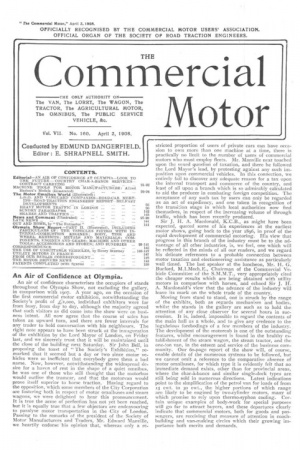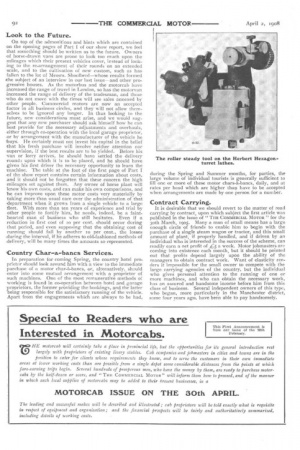An Air of Confidence at Olympia.
Page 1

Page 2

If you've noticed an error in this article please click here to report it so we can fix it.
An air of confidence characterises the occupiers of stands throughout the Olympia Show, not excluding the gallery, in comparison with 1907. A year ago, on the occasion of the first commercial motor exhibition, notwithstanding the Society's profit of .4'2,000, individual exhibitors were far from busy, from day to day, although the majority agreed that such visitors as did come into the show were on business intent. All now agree that the course of sales has taken an upward turn, and there are fewer intervals for any trader to hold conversation with his neighbours. The right note appears to have been struck at the inauguration of the exhibition by the Lord Mayor of London, on Friday last, and we sincerely trust that it will be maintained until the close of the building next Saturday. Sir John Bell, in proposing the toast of " The Society's Exhibition," remarked that it seemed but a day or two since motor vehicles were so inefficient that everybody gave them a bad name. Now, however, notwithstanding the widespread desire for a haven of rest in the shape of a quiet omnibus, he was one of those who still thought that the motorbus would outlive the tramcar, and that the rnotorvan would prove itself superior to horse traction. Having regard to the opposition, which some members of the City Corporation are fostering both in respect of motor omnibuses and steam wagons, we were delighted to hear this pronouncement. It is true the acme of perfection has not yet been reached, but it is equally true that a few objectors are endeavouring to paralyse motor transportation in the .City of London. Passing to the remarks of the president of the Society of Motor Manufacturers and Traders, Mr. Edward Manville, we heartily endorse his opinion that, whereas only a re
stricted proportion of users of private cars can have occasion to own more than one machine at a time, there is practically no limit to the number of users of commercial motors who must employ fleets. Mr. Manville next touched upon the vexed question of taxation, and there he followed the Lord Mayor's lead, by protesting against any such imposition upon commercial vehicles. In this connection, we entirely fail to discover any adequate reason for a tax upon the internal transport and commerce of the country, and least of all upon a branch which is so admirably calculated to aid the producer in combating foreign competition. The acceptance of any such tax by users can only be regarded as an act of expediency, and one taken in recognition of the transition stage in which local authorities now find themselves, in respect of the increasing volume of through traffic, which has been recently produced.
Sir J. H. A. Macdonald, K.C.B., as might have been expected, quoted some of his experiences at the earliest motor shows, going back to the year 1896, in proof of the rapid development of commercial motoring. IIis view that progress in this branch of the industry must be to the advantage of all other industries, is, we feel, one which will be reflected in the minds of all our readers, and we regard his delicate references to a probable connection between motor taxation and electioneering assistance as particularly well timed. The last speaker at the luncheon, Mr. H. G. Burford, M.I.Mech.E., Chairman of the Commercial Vehicle Committee of the S.M.M.T., very appropriately cited the cheaper results which are being obtained with utility motors in comparison with horses, and echoed Sir J. H. A. Macdonald's view that the advance of the industry will leave its mark on the whole trade of the country.
Moving from stand to stand, one is struck by the range of the exhibits, both as regards mechanism and bodies, whilst the stands in the gallery are such as to hold the attention of any close observer for several hours in succession. It is, indeed, impossible to regard the contents of the main hall as a whole, and to give any credence to the lugubrious forebodings of a few members of the industry. The development of the motorcab is one of the outstanding features, whilst encouragement is found in the healthy establishment of the steam wagon, the steam tractor, and the one-ton van, in the esteem and service of the business community. Our 6o-page report of the show will, of course, enable details of the numerous systems to be followed, but we cannot omit a reference to the comparative absence of motor omnibuses, for which type it is evidently felt that no immediate demand exists, other than for provincial areas, where the char-à-bancs and similar single-deck types are still being sold in numerous directions. Latest indications point to the simplification of the petrol van for loads of from 15 cwt. to 3o cwt., the higher portions of which range are likely to be engined by two-cylinder motors, many of which promise to rely upon thermo-syphon cooling. Certain unique examples of body-work for special purposes will go far to attract buyers, and these departures clearly indicate that commercial motors, both for goods and passengers, are receiving that measure of attention in coachbuilding and van-making circles which their growing importance both merits and demands.
Look to the Future.
On top of the admonitions and hints which are contained on the opening pages of Part I of our show report, we feel that something should be written as to the future. Owners of horse-drawn vans are prone to look too much upon the mileages which their present vehicles cover, instead of looking to the re-arrangement of their rounds on an extended scale, and to the cultivation of new custom, such as has fallen to the lot of Messrs. Shoolbreci—whose results formed the subject of an interview in our last issue—and other progressive houses. As the motorbus and the motorcab have increased the range of travel in London, so has the motorvan increased the range of delivery of the tradesman, and those 11-1.-to do not move with the times will see sales annexed by -other people. Commercial motors are now an accepted lactor in all business circles, and they will not allow themselves to be ignored any longer. In thus looking to the future, new considerations must arise, and we would suggest that any new purchaser should ask himself how he can best provide for the necessary adjustments and overhauls, .either through co-operation with the local garage proprietor, or by arrangement with the manufacturer of the vehicle he buys. He certainly must not invest his capital in the belief that his fresh purchase will involve neither attention nor -supervision, if the best results are to be yielded. Before his -van or lorry arrives, he should have settled the delivery round-3 upon which it is to be placed, and he should have given his ,first driver the necessary opportunity to learn the machine. The table at the foot of the first page of Part I .of the show report contains certain information about costs, and it should not be forgotten that these concern the high mileages set against them. Any owner of horse plant will know his own costs, and can make his own comparisons, and 'he can improve upon these motor costs very materially by taking more than usual care over the administration of that department when it grows from a single vehicle to a large fleet. With more than ten years of experience and trial by .other people to fortify him, he needs, indeed, be a fainthearted man of business who still hesitates. Even if a reduction in first cost of so per cent, should occur during that period, and even supposing that the obtaining cost of running should fall by another so per cent., the losses during the interval, if he adheres to old-fashioned methods of delivery, will be many times the amounts so represented.
Country Char-w-bancs Services.
In preparation for coming Spring, the country hotel proprietor should look around him. with a view to the immediate purchase of a motor char-i-bancs, or, alternatively, should enter into some mutual arrangement with a proprietor of such machines. One of the most remunerative methods of working is found in co-operation between hotel and garage -proprietors, the former providing the bookings, and the latter "being responsible for the satisfactory running of the vehicle. Apart from the engagements which are always to be had, during the Spring and Summer months, for parties, the large volume of individual tourists is generally sufficient to fill one or more of these motor chars-a-bancs, daily, and at rates per head which are higher than have to be accepted when arrangements are made by one person for a number.
Contract Carrying.
It is desirable that we should revert to the matter of road carrying by contract, upon which subject the first article was published in the issue of "THE COMMERCIAL MOTOR" for the 3oth March, 1905. Many a man of small means has a large enough circle of friends to enable him to begin with the purchase of a singfe steam wagon or tractor, and this small amount of plant, if properly handled, and if driven by an individual who is interested in the success of the scheme, can readily earn a net profit of 4'5 a week. Motor jobmasters are coming into existence each month, but it should be pointed out that profits depend largely upon the ability of the managers to obtain contract work. Want of elasticity renders it impossible for the small owner to compete with the large carrying agencies of the country, but the individual who gives personal attention to the running of one cr more machines, and who can obtain the necessary work, has an assured and handsome income before him from. this class of business. Several independent owners of this type, who began, more particularly in the Manchester district, some four years ago, have been able to pay handsomely.




























































